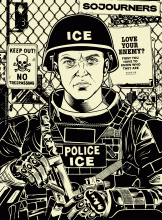I have never met Robert Alfieri, but he is my enemy.
Alfieri is acting assistant field office director for Immigration and Customs Enforcement in my part of North Carolina. For Alfieri, it’s a job. He believes he keeps people like me safe from violent criminals. But in the time that Alfieri has overseen ICE in our area, hundreds of people, mostly Latinx community members, have been disappeared at traffic stops and picked up during raids at their workplaces. At our local elementary school, children wait in administrators’ offices for a parent who will never show up. Birthday parties and baptisms are tinged with anxiety and sadness as communities contemplate the forced separation from those they love. Families scramble to make ends meet when a primary breadwinner is kidnapped at work.
In a recent round of ICE raids in Durham, a young father was picked up while packing his car for work, collateral damage among the targets set by ICE. In a nearby NICU his premature infant—born at seven months—waited alone. Maria, the baby’s mother, recovered from surgery while her spouse sat in a detention center, hoping our community could raise the $15,000 bond set by a judge. Eventually they raised $7,000, securing the rest through a loan. ICE officials “don’t have a heart,” Maria told a local reporter.
This young father, the main wage earner for his family, was in ICE detention for many reasons, including xenophobic immigration policies, decades of U.S. interventionist politics in Central America, the mythic war on drugs, and the complicity of the American public in fictive safe-keeping from their undocumented neighbors. But he was also in ICE detention, separated from his family, because of Robert Alfieri.
An unsung discipline
When someone shares with me that they have an enemy, it is often in pastoral confidence, whispered as a confession. Having an enemy, they intuit, is a botched form of discipleship resulting from failed reconciliation. The language of enemies is seen as the end of a conversation—or the end of relationship.
Read the Full Article

